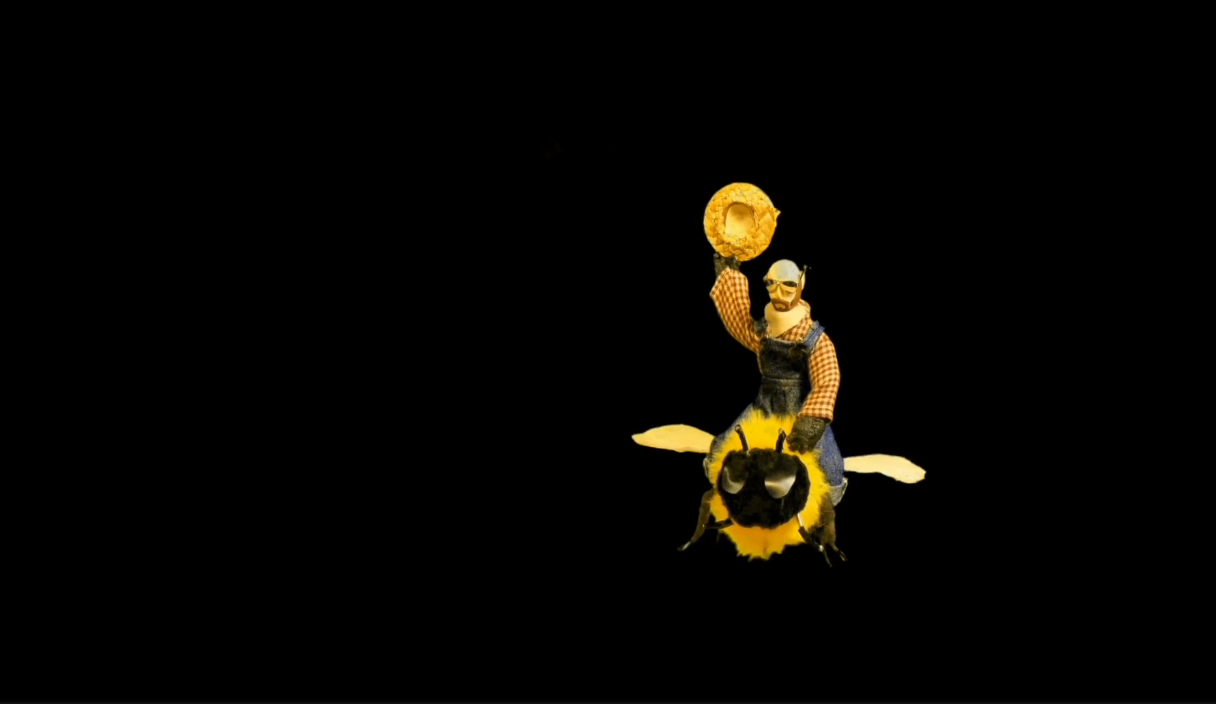By Lisa Biehle Files
Bryn Wright’s winning elementary school film “Bad Bugs” will screen at the Festival Launch Party on March 4, as well as the Young Filmmakers Awards Celebration on March 12.
From manatees to koalas to pangolins, endangered wildlife was a recurring theme among 148 submissions to the 2022 One Earth Young Filmmakers Contest. Students ages 8 to 25 revealed the impact of weather extremes and plastic pollution on people, animals, and the planet, with a new note of urgency about the climate crisis in their short films.
Almost 40 percent of submissions were animated or stop-motion films, leading Contest Founding Director Sue Crothers to conclude that young, creative minds were hard at work despite pandemic isolation: “Filmmaking is usually collaborative when done in person, but because of Covid-19, more students channeled their energy into techniques that are more solitary but still enabled them to communicate artfully.”
She added, “Many of the films feel raw; they do not speak of hope, but instead urge governments and individuals to act now or never.”
A farmer bids adieu while riding a bee at the end of post-grad winning film “Endangered” by Tim DeBlois. See his film at the Festival Launch Party on March 4 as well as the Young Filmmakers Awards Celebration on March 12.
For 10 years, the Young Filmmakers Contest has asked students from grade 3 to age 25 to create 3- to 8-minute environmental films that inspire change or action (stop motion or animated films can be a minimum of 45-seconds long). Seven prizes range from $100 to $1,000, along with matching gifts, which winners donate to nonprofits supporting the theme of their films. This year, two new Activism Awards for $500 were added to the mix, one sponsored by Food and Water Watch and the other by Jane Goodall Institute Australia.
Though films are accepted from students enrolled in USA schools only, the Young Filmmakers Contest started a new pilot program in Australia, which garnered a winning film.
All top winners will be screened virtually in an entertaining awards event on Saturday, March 12, at 3 p.m. Central Standard Time. We invite children ages 8+ and general audiences. Along with Crothers, the guest host will be Adam Joel of Aggressively Compassionate. Click the button below to reserve your free tickets:
Additionally, 13 Honorable Mention films will screen at two online awards events in April, near Earth Day. Because of parallel themes, four of these Honorable Mention films will be paired with feature films at the One Earth Film Festival in March. Stefie Gan’s “Plastic Ecosystem” will screen with “Plastic Bag Store: The Film” on March 11; Callie Deng’s “Sealing the Leak” will precede “Understory” on March 12; and films about wildlife by siblings Piper and Henry Sobel will be shown before “Extinction” on March 13. Look for another article in April describing all 13 Honorable Mention films.
Learn more about top prize winning films below.
Bryn Wright
Elementary School Award
“Bad Bugs” (2 min)
$100 + $100 matching gift
donated to Beyond Pesticides
Bryn Wright
Grade 5, El Camino Creek Elementary School
Carlsbad, California
Bryn’s 2-minute film “Bad Bugs” is a stop-motion claymation, delightful in its simplicity. She demonstrates natural solutions to pest problems in our gardens: ladybugs eat hornworms, lizards consume black widow spiders, and crows devour grubs. Bryn explains that we shouldn’t use pesticides because they kill the bad bugs and the good bugs too. She concludes her film by humming a jazzy tune while clay critters scamper across the screen.
Lion Birnecker
Middle School Award
“Take Action Against Lead” (6 min)
$200 + $200 matching gift
donated to Current Water
Lion Birnecker
Grade 8, Homeschool
Evanston, Illinois
Lion’s 6-minute film “Take Action Against Lead” starts out without a history lesson about the use of lead in ancient Roman aqueducts and infrastructure. “It is durable, strong, cheap and easy to obtain. It has been used for 6,000 years. It is also poisonous,” he says. Jumping ahead to the city of Chicago today, Lion points out that Chicago has more lead pipes than any other city in the United States. Removing lead service lines costs far more here than in other cities, on average, which may account for the slow removal rate. His film concludes with important, practical suggestions for everyone to reduce lead in tap water.
Colsen and Kayleen Nguyen
High School Award
“The Apocalypse” (6 min)
$350 + $350 matching gift donated to Sierra Club
Kayleen Nguyen
Grade 11, John F. Kennedy High School
Colsen Nguyen
Grade 8, Sutter Middle School
Sacramento, California
Using stop-motion paper cutouts, sister and brother Kayleen and Colsen create a dystopian future in the 6-minute film “The Apocalypse,” where people live in bunkers because of extreme flooding, wildfires, hurricanes and tornadoes. Tchaikovsky music plays while Kayleen narrates the action dramatically, showing memories of bucolic scenes before “The Apocalypse.” Then Colsen pulls us back to the present day, listing facts and figures about recent weather extremes, explaining that humans have warmed the planet at a rate unprecedented in the past 2,000 years. The news is grim but “The Apocalypse” ends on a note of hope. Debussy music plays while Kayleen concludes that we can make a difference by building awareness and electing leaders who will make changes to save the planet.
Shannon Germaine
College Scholarship Award
“Code Red: The Clean Air Act’s Battle Against Climate Change” (6.5 min)
$1,000 + $1,000 matching gift
donated to Greenpeace USA
Shannon Germaine
Grade 12, Clonlara School
Ann Arbor, Michigan
Shannon’s 6.5-minute film “Code Red: The Clean Air Act’s Battle Against Climate Change” focuses on how pivotal the Clean Air Act has been in the fight against climate change. She interviews a Michigan senator, two nonprofit policy directors, and a Greenpeace research specialist, about the less partisan history and current relevance of this 50-year-old legislation. Shannon shows the Clean Air Act as a literal sword fighting the dragon of climate change in a short, animated portion of her film. She concludes that despite its flexibility, the Clean Air Act should be updated and strengthened.
Jaqki Guerrero
Sally Stovall Planet Warrior Award for Creativity (Scholarship)
“Our Generation” (5 min)
$1,000 + $1,000 matching gift
donated to Natural Resources Defense Council
Jaqki Guerrero
Grade 12, Penn High School
Mishawaka, Indiana
Jaqki’s 5-minute film “Our Generation,” is a heartfelt spoken word piece expressing existential despair about climate change and other ills the older generations are leaving behind for the young to solve. As she speaks in black and white, she overlays color images from the news, protests, and the environment. “We are the matches being lit up like a bonfire. . . while you light our world on fire,” she proclaims. “We accept it as fate, our young minds seized.” A dripping candle is a metaphor throughout her film for people and planet slipping away. On the final screens, Jaqki encourages viewers to make change at the individual level, suggesting nonprofits worthy of donations.
Activism Award
“Koala Protection: Ways We Can Help Koalas” (3.5 min)
$500 donated to the winners by Jane Goodall Institute Australia
Sophie Ravanat, Eleanor Somerville, Maia Jorgensen, Elliot Bonney-Millet, Ashleigh Ramirez, Abbey Southern
Sophomores, Griffith University
South Brisbane, Queensland, Australia
Australians are still dealing with the aftermath of the terrible bushfires of 2019-20. At that time, tens of thousands of koalas were killed, hurt, or displaced when eucalyptus forests were destroyed. The 3.5-minute film “Koala Protection: Ways We Can Help Koalas” has no dialogue and uses actors to demonstrate various ways to help koalas found wandering in urban and suburban areas: from keeping your dogs inside at night to calling a helpline if you see trapped, sick, or injured koalas.
Jarrett Smith
Activism Award
“Back on the Path” (7.5 min)
$500 donated to the winner
by Food and Water Watch
Jarrett Smith
Senior, Full Sail University
Winter Park, Florida
In his 7.5-minute film “Back on the Path,” Jarrett interviews Ally Greco from Save the Manatee Club to gather facts about these gentle marine mammals in peril. Much of their habitat is no longer viable because of diminishing seagrass, their main food source. Runoff from fertilizers and other pollutants are the culprit, causing algae blooms that block the sunlight needed for seagrass to photosynthesize. Jarrett layers news clips with images of geographic areas most affected , finishing his film with tips from Ally about how to help these casualties of eutrophication.
Tim DeBlois
Post-Graduate Award
“Endangered” (4 min)
$1,000 + $1,000 matching gift
donated to Arbor Day Foundation
Tim DeBlois
Recent Graduate, Hampshire College
Amherst, Massachusetts
Tim’s 4-minute stop-motion film “Endangered” takes us first to farm country and then inside a healthy beehive, where a queen lays eggs and worker bees care for her young. Meanwhile, a nearby farmer sprays pesticide on his garden, which falls like white cotton onto some of the foraging bees. They bring the white poison back to the hive, infecting others, including their young. Oblivious to his impact, the farmer sits in a rocking chair whistling, while, ironically, reading about the extinction of bees. There is no narration nor score, making the background birdsong and sound effects of the bees’ slowing movements more poignant.
Jingqi Zhang
Animation Award
“Hopper’s Day” (5 min)
$1,000 + $1,000 matching gift donated to
Food and Water Watch and
Environmental Law and Policy Center
Jingqi Zhang
Senior, California Institute of the Arts
Santa Clarita, California
Jingqi’s “Hopper’s Day” is a 5-minute animation about competition for resources in a world of predation. Water is a precious resource in an abandoned quarry, where a small grasshopper competes for access with an army of ants while trying to avoid a hungry crow and lizard. The water Hopper wants is not just a selfish desire but for a glorious garden oasis hidden in an old boot. A lush musical score begins when water finally reaches the garden, where flowers miraculously emerge.
Jingqi Zhang’s winning animation “Hopper’s Day” will screen at the Young Children’s Short Film Program (ages 3-8+) on March 5 in addition to the Young Filmmakers Awards Celebration on March 12.
The above films were reviewed by a jury of 16 leaders in film and sustainability: Deborah Adelman, Felice Bassuk, Katie Brennan, Amy Brinkman, Lisa Daleiden-Brugman, Monica Fox, Paula Froehle, Bill Gee, Patrick Thomas Keen, Jennifer Maiotti, Jonathan Moeller, Julie Moller, Jim Rohn, Karen Weigert, Risé Sanders Weir, and Marc Wellin.













